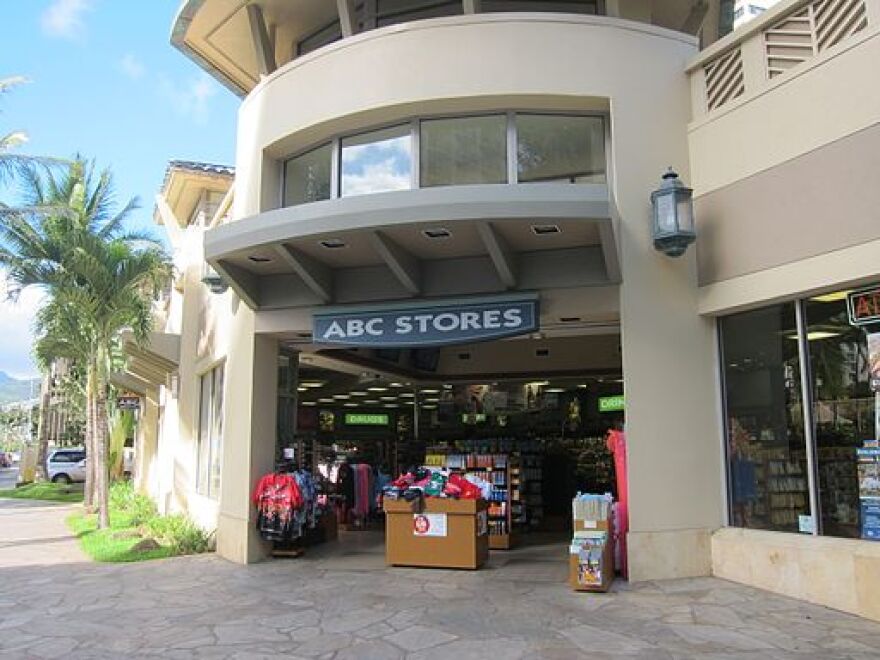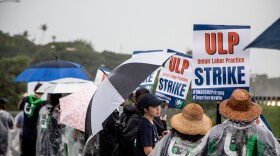As we approach the end of 2021, COVID-19 cases are rising again nationally and locally, inflation is spiking to its highest point in nearly 40 years, and our local economic recovery continues to be uneven.
At the same time, there are positive developments for Hawaiʻi. But for local businesses, the uncertainty makes planning difficult. How should businesses look ahead to 2022 and beyond?
Paul Kosasa is the President and CEO of the locally-owned ABC Stores. His parents Sidney and Minnie started the company with a single drug store in Kaimuki in 1949. They got married during the war at the Tule Lake internment camp in California where they were both held.

They opened the first ABC Stores in Waikiki in the mid-1960s. Paul Kosasa became CEO in 1999. He’s seen a lot of twists and turns in the local business world since then. He shared some of his perspectives on local businesses, tourism, and what the future may hold for Hawaiʻi as a whole.
———
HPR'S BILL DORMAN: It's a bit complicated to answer these days: how's business?
PAUL KOSASA: Business is OK, you know, it's sort of a neutral answer. It's not bad, but it's not good either. But 2021 since June has been a pretty good recovery. Back in August, though, when the governor made his announcement to the world, "don't come," they heeded that message. So it did slow down quite a bit. It's recovered a bit, especially since the restrictions have been lifted in early December. I think that was a positive point. So visitors are slowly coming back — and locals too — since locals have to buy things from us too. We're fortunate right now that it's OK. But compared to prior years, 2019, 2018, 2017, we're pretty far off from that.
Strategically, you're always playing a longer game. When you look at the tourism market here — it's domestic, it's international as well — what do you see? How do you plan?
It's pretty difficult to plan and that's one of the things that we're working on right now, is our budgeting. It's sort of like, whatever playbook we used in the past, we just got to throw it away, and start over because it's a new world. We are fortunate that a lot of domestic visitors are coming from the U.S. and Canada. But we are sorely missing the Asian visitors, as you know and reported, Asian visitors spend more per capita than the westbound tourists. And so a lot of businesses that are dependent upon the Asian visitor have suffered, are still suffering. We are very good at balancing the mix between Asian and domestic visitors. So the commodities and products that we sell attract both. So right now, we just lean more toward domestic visitors and that's why we are surviving right now.
When you look at cost of living in Hawaiʻi going higher, again, from a strategic standpoint, how do you plan for the future?
You have to do the best that you can. There's a labor shortage that you mentioned earlier. So our labor costs have gone up, but intentionally too because people have to make a living here and the high cost of Hawaiʻi. So we increased our wages for our people, which shrinks our margins even further. We do a little bit more promotions to draw more traffic, so to get ourselves up and consequently our profits, but at the same time, the real estate valuations are going up too. I think you just have to do more with less.
How's your staffing situation?
We lost quite a few people as a result of the pandemic. Many I think moved away from Hawaiʻi. We've managed to get most of our employees back. But we are still short, maybe 100 or 200 people to be fully staffed. The situation now though, is because our sales, our volume is still on the softer side, it's not as urgent as it was maybe in the summertime. But going forward as we recover, I do anticipate struggles in covering our stores. Incidentally, we did close permanently some stories. It's just the pandemic has just really affected everyone's business and our suppliers. So some of our suppliers are still struggling or they gave up. They just gave up their business. So we're looking for alternatives. So when you accumulate all of that, how do you plan for 2022, 2023? We just keep working harder, and hopefully, keep your fingers crossed, that things will get better.

The minimum wage is likely to come back as a discussion point at the state Legislature this next session. How do you feel about that?
Well, it's due to raise the minimum wage. In fact, my position was that it should have been enacted earlier. Because if we did that, then I think the gradual increases of minimum wages is a lot easier to handle rather than a big chunk. Maybe this legislative session, they'll try to make up for the prior sessions, I think.
You raised wages yourself, not because of the law or anything, but because of market forces, correct?
Yeah, I mean it's the market. If you need people, then you're going to have to attract them. Younger people, many live paycheck to paycheck, and they need a decent income. And benefits are expensive too — health care, insurance is going up. Gas prices are high, transportation. So I'm not alone in this. I think all the businesses are cognizant of the fact that it's a tightening of the market.
How are you looking at Hawai'i's commercial real estate market right now?
I'm optimistic. I think it's a little hot still. Anecdotally, I mean, if you start seeing more empty storefronts, landlords will adjust. I think they are beginning to realize that our locations where we shut down was really dependent on the Asian visitors, the Japanese in particular. So those locations are — there's no traffic there. Commercial real estate, I think it probably just needs a reset, right now. My opinion: it's still a little bit high. But time will tell if there are further adjustments. What I don't know, is foreign investment — whether that may prop up the pricing, so that it doesn't adjust. But we'll see. But my optimism is because, you know, many restaurants had closed, right. But recently, many restaurants have reopened. And so I'm optimistic that that's a good sign that there are people that confident about the market. And the more restaurants that open, it sends a signal to the market and the community that, "Hey, we're open for business, come on down and eat."
Are you seeing foreign money behave differently than Hawaiʻi money, than U.S. mainland money? Are those three different buckets?
Hmm, that's a good question. I never thought of money as behaving differently. I think Hawaiʻi is a victim of its own beauty and success, right? People want to live here. People want to invest here to a point where, you know, is there too much tourism? Is there over-tourism, which affects our natural resources and beauty? So there has to be a balance and I think Hawaiʻi Tourism Authority under John De Fries is approaching it in a very logical, sensible way — there is controlled growth. I hope he's successful at that, because I think he's got some really good ideas to manage the growth — and it prospers everyone.
What excites you about ideas of managing that growth of tourism?
Off the top of my head, I think fees that are charged to certain places like Hanauma Bay, as long as those fees are earmarked for the care and nurturing of the bay — and not siphoned off to rail or something. I think that's appropriate because we're not alone. I think you go to other visitor destinations around the world. There are surcharges or fees, really to maintain the visitor plan. I'm chair of the Waikiki Business Improvement District Association and our mission is to make sure Waikiki is clean and safe, and have ambassadors that greet our visitors. And that is funded primarily by the visitor industry.
How's Waikiki doing these days?
I think Waikiki is doing fine. The hotels have lower occupancies, probably in the 40s, 50s and 60s right now. In a way, it gives Waikiki a chance to kind of regroup and get cleaned up a little bit better. That's pretty much almost done already. So we're ready for visitors to come back. And I think the amount of hotel rooms that we have right now is good. I know there are a couple more projects that are coming up. And I think that Waikiki has the capacity to manage those additional rooms — and really is getting people back employed again, and hopefully, we come out of this better and higher quality.

When you look at the future of Hawaiʻi business on a broader scale, what gets you excited and what, if not, keeps you up at night?
For businesses, you know we started off as a mom-and-pop business and we were fortunate and lucky to grow. This pandemic had affected a lot of mom-and-pop businesses. Some have closed, but some have remained open. And I think for me, one of the attractive things about Hawaiʻi and visiting Hawaiʻi are the mom-and-pop businesses. So yes, while I'd like them to shop at ABC Stores, I also would like them to enjoy the small businesses throughout Oʻahu and the neighbor islands that have a character and a cultural feeling of Hawaiʻi. And as long as they survive, I think that's great for the economy. In contrast, I worry about certain developments that are big box and it's quite evident on Oʻahu and I'm not gonna mention names but, you know, there is a lot of pavement with a lot of parking. I'm not sure if that's kind of what Hawaiʻi's about. I think we have to kind of look at ourselves to see what we want out of our Hawaiʻi. Small businesses, generally speaking, donate more to charity and the community. I don't have evidence on that. But I think they do because they are in this community and they support nonprofits a lot more. So because of that, I think we should support our small businesses and visit them, shop with them. eat at the restaurants. They'll remember your name. That's what I like.
This interview aired on The Conversation on Dec. 16, 2021. The Conversation airs weekdays at 11 a.m. on HPR-1.









